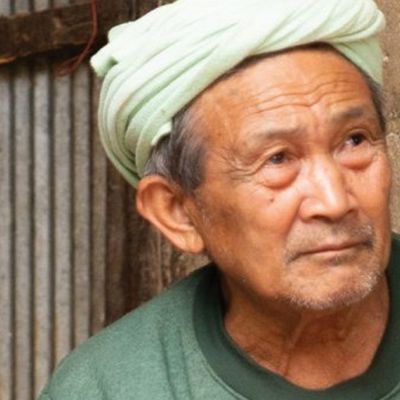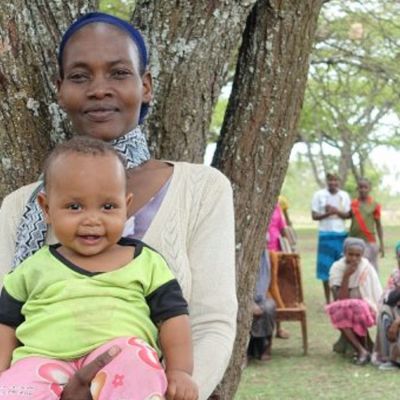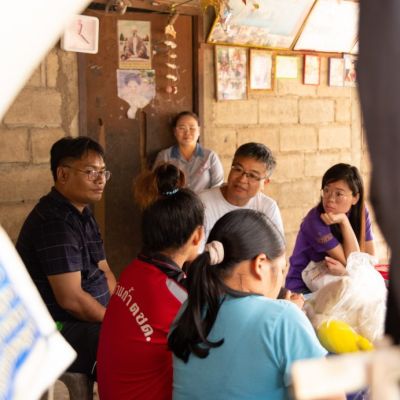We put on armors to fight to eliminate harmful traditional practices
Subvert the harmful influences and effects
We are united and determined to take actions
Because we are now well awaken to the scourge.Ignorant people in the past
Have been badly harmed by them
Because they did not know any better.
Ignorant people in the past believed
Harmful traditional practices were good for them
When indeed their lives were at stake.Female Genital Mutilation is a major harmful practice.
Sugar-coated as prestigious and noble,
FGM suffocated our mothers
We regret and repent for the harm incurred.
FGM steals away sexual pleasures, corrupts marriages
And adds complications to child birth.(Lyrics edited by CEDAR Fund, originally written by a member
from the ant-FGM group in Ethiopia.)
Under the warmth of the bright and serene sun, a group of Ethiopian village and school girls stood before a hundred villagers, and sang the above song with shiny smiles and beaming faces. Some of them had a uniformed yellow T-shirt on, where the slogan “STOP Female Genital Mutilation” was displayed clearly in the local language. This day was the special day of village education day, and also the performance day of the advocacy club.
Even though Ethiopia government had legislated female genital mutilation (FGM) illegal back in 2004, the practice of such act indeed has continued, since the cultural practice is deeply rooted; change of cultural practice and mentality of practitioners often takes time. FGM (also known as female circumcision) is administered on young girls in Ethiopian villages between the age of 12 to 16, usually by female tribe leaders or village healthcare workers. Such “circumcision” can be in various forms. They include removal part or all of the clitoris, inner and outer lips of the vagina, and closure of the vulva. In the last form, known as infibulation, a small hole is left for the passage of urine and menstrual fluid. FGM is a harmful traditional practice that it causes damage to women’s health, such as recurrent infections, pain during intercourse and childbirth, complications during childbirth, and fatal bleeding.
The largest evangelical church network Ethiopian Kale Heywet Church (EKHC) in Ethiopia truly understands the lasting harm that FGM customs imposed on local girls and females, therefore has been committed to fight against it. EKHC explains that communities support FGM due to the following reasons:
- Reducing women’s sexual desires in order to prevent promiscuous sexual behaviour
- Taking FGM as a cultural rite of a girl’s initiation into womanhood
- Regarding FGM as equivalent to male circumcision prescribed in the Bible
Since 2014, CEDAR has been supporting the anti-FGM advocacy programme of EKHC Development Commission (EKHCDC). EKHCDC mobilises schools, churches, and government agencies in the western part of Ethiopia where FGM custom is prevalent. The advocacy activities include village education sessions, formation of advocacy groups in schools and villages, cross religion forums; and most recently small focus groups of mothers were formed, aiming to end FGM at this generation.
The results since 2014 are encouraging: the number of female under-16 who suffers FGM has decreased 80% compared to that in 2012, 49 advocacy groups have been formed with over 3,400 participants. Anti-FGM messages are no longer a taboo but gradually being accepted.
A young married couple opened up and shared their hearty message: they decided to reject such harmful traditional practice, therefore they have been able to enjoy a happy marriage relationship, where the wife does not need to suffer unnecessary pain during sexual intimacy nor childbirth.
In order to reverse a cultural malpractice, especially one that is deeply entrenched in gender inequality, advocacy driven by both genders is essential. We give thanks to God that the EKHC programme has been effective and has brought positive changes to Ethiopia. Though CEDAR’s financial support to this project will end in June 2019, we invite you to continue praying for the beneficiaries, for Ethiopia’s villages that still administer FGM, for the women who suffer from FGM, and for the realisation of Ethiopian government’s will to become a “Zero FGM” country.
Content of this issue
Written by: Lai Ka Chun In mid-2018, a junior football team and their assistant coach were rescued after 18 days in Tham Luang Nang Non cave in Chiang Rai Province, Thailand. Their 25-year-old coach’s care in the cave was indispensable. This incident made the coach a hero in Thais’ hearts. However, this coach was originally stateless, as well as the other 3 boys, who had no Thai citizenships. According to UNHCR, there are about 480,000 stateless people in Thailand, and most of them were living in remote mountainous area near the border. As they belonged to no country, they could not enjoy the rights of education, healthcare, employment, and social security as other citizens. Even though they lived…
Written by: Au Bing Chung (Lecturer at the Christian Ministry Institute) Resurrection is an eschatological idea, and Integral Mission addresses the responsibility and stewardship of Christians living on earth. Although there seems to be no apparent connection between the two, the eschatological view of Christians will affect how they interpret their missions. For instance, if a person believes that the world will be in ultimate destruction at the end days, he will put less effort in constructing a world that will be wiped out eventually. On the other hand, if the believers anticipate a forthcoming new world that is connected to and evolved from the present world, they will somehow attend to the world’s development and conservation. Paul…
We put on armors to fight to eliminate harmful traditional practicesSubvert the harmful influences and effectsWe are united and determined to take actionsBecause we are now well awaken to the scourge. Ignorant people in the pastHave been badly harmed by themBecause they did not know any better.Ignorant people in the past believedHarmful traditional practices were good for themWhen indeed their lives were at stake. Female Genital Mutilation is a major harmful practice.Sugar-coated as prestigious and noble,FGM suffocated our mothersWe regret and repent for the harm incurred.FGM steals away sexual pleasures, corrupts marriagesAnd adds complications to child birth. (Lyrics edited by CEDAR Fund, originally written by a memberfrom the ant-FGM group in Ethiopia.) Under the warmth of the bright…
Banner image: The author (far right) and other trippers visited ethnic minorities in northern Thailand Written by: Janice Cheng (participant of CEDAR’s exposure trip in 2018; church pastor) In December last year, I went to the Thai-Myanmar border with CEDAR to learn about their poverty alleviation projects in the area. The 8-day trip enabled me to understand more about the region. We visited some villages with CEDAR’s local partners and spoke to various individuals during our time there. The residents are mostly ethnic minority groups from the mountainous areas, and they all have their own predicaments to overcome. There are abandoned single mothers and minority groups who have been relocated to the border area in northern Thailand due…






